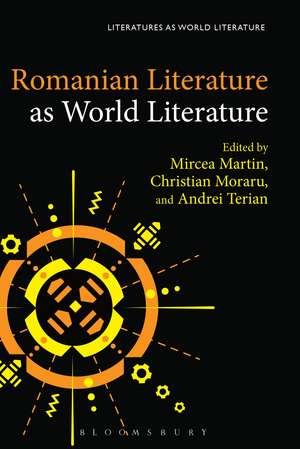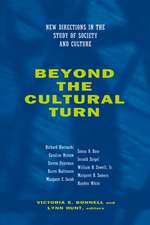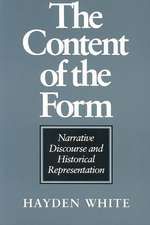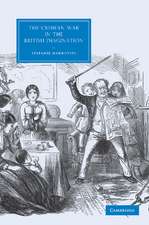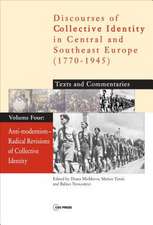Romanian Literature as World Literature: Literatures as World Literature
Editat de Dr. Mircea Martin, Professor Christian Moraru, Dr. Andrei Terianen Limba Engleză Paperback – 26 iun 2019
| Toate formatele și edițiile | Preț | Express |
|---|---|---|
| Paperback (1) | 233.99 lei 6-8 săpt. | |
| Bloomsbury Publishing – 26 iun 2019 | 233.99 lei 6-8 săpt. | |
| Hardback (1) | 718.19 lei 6-8 săpt. | |
| Bloomsbury Publishing – 27 dec 2017 | 718.19 lei 6-8 săpt. |
Din seria Literatures as World Literature
- 20%
 Preț: 219.84 lei
Preț: 219.84 lei - 23%
 Preț: 191.13 lei
Preț: 191.13 lei - 28%
 Preț: 466.39 lei
Preț: 466.39 lei - 23%
 Preț: 191.92 lei
Preț: 191.92 lei - 23%
 Preț: 192.19 lei
Preț: 192.19 lei - 22%
 Preț: 251.65 lei
Preț: 251.65 lei - 22%
 Preț: 236.92 lei
Preț: 236.92 lei - 24%
 Preț: 190.33 lei
Preț: 190.33 lei - 23%
 Preț: 197.14 lei
Preț: 197.14 lei - 23%
 Preț: 193.18 lei
Preț: 193.18 lei - 23%
 Preț: 191.67 lei
Preț: 191.67 lei - 23%
 Preț: 199.20 lei
Preț: 199.20 lei - 23%
 Preț: 199.37 lei
Preț: 199.37 lei - 30%
 Preț: 776.32 lei
Preț: 776.32 lei - 23%
 Preț: 190.87 lei
Preț: 190.87 lei - 23%
 Preț: 192.64 lei
Preț: 192.64 lei - 22%
 Preț: 833.47 lei
Preț: 833.47 lei - 23%
 Preț: 193.36 lei
Preț: 193.36 lei - 30%
 Preț: 718.19 lei
Preț: 718.19 lei - 21%
 Preț: 217.27 lei
Preț: 217.27 lei - 23%
 Preț: 192.01 lei
Preț: 192.01 lei - 22%
 Preț: 231.81 lei
Preț: 231.81 lei - 23%
 Preț: 198.12 lei
Preț: 198.12 lei - 13%
 Preț: 256.59 lei
Preț: 256.59 lei - 23%
 Preț: 197.42 lei
Preț: 197.42 lei - 22%
 Preț: 238.49 lei
Preț: 238.49 lei -
 Preț: 239.14 lei
Preț: 239.14 lei - 30%
 Preț: 539.49 lei
Preț: 539.49 lei - 30%
 Preț: 540.38 lei
Preț: 540.38 lei
Preț: 233.99 lei
Preț vechi: 298.75 lei
-22% Nou
44.77€ • 46.87$ • 37.05£
Carte tipărită la comandă
Livrare economică 07-21 aprilie
Specificații
ISBN-10: 1501354647
Pagini: 376
Dimensiuni: 152 x 229 x 26 mm
Greutate: 0.5 kg
Editura: Bloomsbury Publishing
Colecția Bloomsbury Academic
Seria Literatures as World Literature
Locul publicării:New York, United States
Caracteristici
Notă biografică
Mircea Martin is Professor Emeritus in the Department of Literary Studies at the University of Bucharest, Romania, and a prominent figure of post-World War II East European literary criticism, theory, and comparative studies. A corresponding member of the Romanian Academy, he is Editor-in-Chief of Euresis: Romanian Journal of Literary and Cultural Studies and president of the Romanian Association of General and Comparative Literature. His latest book is Radicalism and Nuance (2015).Christian Moraru is Class of 1949 Distinguished Professor in the Humanities and Professor of English at University of North Carolina, Greensboro. He is the author and editor of a number of books, including Cosmodernism: American Narrative, Late Globalization, and the New Cultural Imaginary (2011) and Reading for the Planet: Toward a Geomethodology (2015).Andrei Terian is Dean of Faculty of Letters and Arts and Professor of Romanian Literature in the Department of Romance Studies of Lucian Blaga University of Sibiu, Romania. He is also a senior researcher with the G. Calinescu Institute of Literary History and Theory of the Romanian Academy. His latest books include the co-authored reference series General Dictionary of Romanian Literature (7 volumes, 2004-2009) and Chronology of Romanian Literary Life: 1944-1964 (10 volumes, 2010-2013).
Cuprins
ContributorsPreface and AcknowledgmentsIntroduction: The Worlds of Romanian Literature and the Geopolitics of ReadingChristian Moraru (University of North Carolina, Greenboro, USA) and Andrei Terian (Lucian Blaga University of Sibiu, Romania)Part I: The Making and Remaking of a World Literature: Revisiting Romanian Literary and Cultural History1. Mihai Eminescu: From National Mythology to the World PantheonAndrei Terian (Lucian Blaga University of Sibiu, Romania)2. Aux portes de l'Orient, and Through: Nicolae Milescu, Dimitrie Cantemir, and the "Oriental" Legacy of Early Romanian LiteratureBogdan Cretu (Alexandru Ioan Cuza University of Iasi, Romania)3. "Soft" Commerce and the Thinning of Empires: Four Steps Toward Modernity Caius Dobrescu (University of Bucharest, Romania)4. Beyond Nation Building: Literary History as Transnational Geolocation Alex Goldis (Babes-Bolyai University of Cluj-Napoca, Romania)5. After "Imitation": Aesthetic Intersections, Geocultural Networks, and the Rise of Modern Romanian Literature Carmen Musat (University of Bucharest, Romania)Part II: Literature in the Plural6. Reading Microliterature: Language, Ethnicity, PolyterritorialityMircea A. Diaconu (Stefan cel Mare University of Suceava, Romania)7. Trees, Waves, Whirlpools: Nation, Region, and the Reterritorialization of Romania's Hungarian LiteratureImre József Balázs (Babes-Bolyai University of Cluj, Romania)8. Cosmopolites, Deracinated, étranjuifs: Romanian Jews in the International Avant-GardeOvidiu Morar (Stefan cel Mare University of Suceava, Romania)9. Communicating Vessels: The Avant-Garde, Antimodernity, and Radical Culture in Romania between World War I and World War IIPaul Cernat (University of Bucharest, Romania)Part III: Over Deep Time, across Long Space10. Temporal Webs of World Literature: Rebranding Games and Global Relevance after World War II-Mircea Eliade, E. M. Cioran, Eugène Ionesco Mihai Iovanel (G. Calinescu Institute of Literary History and Literary Theory of the Romanian Academy, Romania)11. A Geoliterary Ecumene of the East: Socialist Realism-The Romanian CaseMircea Martin (University of Bucharest, Romania)12. Romanian Modernity and the Rhetoric of Vacuity: Toward a Comparative Postcolonialism Bogdan Stefanescu (University of Bucharest, Romania)13. Gaming the World-System: Creativity, Politics, and Beat Influence in the Poetry of the 1980s GenerationTeodora Dumitru (G. Calinescu Institute of Literary History and Literary Theory of the Romanian Academy, Romania)14. How Does Exile Make Space? Contemporary Romanian Émigré Literature and the Worldedness of Place: Herta Müller, Andrei Codrescu, Norman ManeaDoris Mironescu (Alexandru Ioan Cuza University of Iasi, Romania)15. Made in Translation: A National Poetics for the Transnational WorldMihaela Ursa (Babes-Bolyai University of Cluj, Romania)BibliographyIndex
Recenzii
"[Romanian Literature as World Literature] exhaustively examines and clearly displays the magnitude and value of Romanian literature, as it is more often than not regarded as "peripheral" or not European "enough". Furthermore, this volume gives voice to our heritage as Romanians by making our literature transnational. The multifaceted approach gives way to both a comprehensive overview of this challenge and development associated with Romanian literature read as world literature, which proves to be important for future research and reflection."
"Published by Bloomsbury in the series Literatures as World Literature, this is a well-timed book looking to reshape the history of Romanian literature and culture for the twenty-first century. For all its diversity, the book has a common drive: its contributors - the youngest generation of Romanian literary scholars - are devising tools and coining analytical categories with which to revisit the scenarios of the existing Romanian literary histories and to (re)chart modern Romanian literature . Overall, this study stands out first and foremost through its ability to ask the most pressing questions on the subject, to single out the key dilemmas and to open up relevant paths for future research. The convergent effort of the contributors to bring together literary history and comparative literature with cultural studies, translation studies and imagology is worth noting . The authors are successful throughout in deconstructing the discourse of national and ethnic essentialism, in step with the most recent developments in literary research: the replacement of the national-modular categorization of literary traditions, the "intersectional" notions of identity formation, the demise of Eurocentrism and the rise of post nationalism."
Romanian Literature as World Literature has a salutary effect, for it succeeds in providing a set of well-documented and pertinent answers meant to cure Romanian literature of the symptoms of nationalism . The volume published in the prestigious Bloomsbury Academic's series 'Literature as World Literature' edited by Thomas O. Beebee comprises a theoretically dense Introduction and 15 articles that demythologize the 'national reading' of literature, proposing a paradigmatic and epistemological shift that integrates Romanian literature into a nodal qua cosmopolitan and multifaceted ethno-linguistic context in which centers, hierarchies, and hegemonic claims are blurred . RLWL can serve as an indispensable tool for scrutinizing other eastern European literatures. It is, above all, a theoretical 'manifesto' that successfully revises and redefines Romanian literature as Weltliteratur, and integrates it into a global geocultural palimpsest . [T]he volume deserves a Romanian translation so as to familiarize national readers with a timely revisionist project that is apt to contribute to the making of a 21st-history of Romanian literature, and also to generate further debates among Romanian critics.
[The volume's contributors] reject the notion that a literature can be confined within political boundaries-that it can, in a sense, be withdrawn from the wider zones of literature and culture and still remain creative ... [A] pioneering and provocative volume. Its authors apply modern literary theory and analysis to reveal to the specialist and the comparatist the travails and achievements of Romanian writers in diverse intellectual climates, and they challenge long accepted frameworks for a national literature. The historian of Romanian society will also find stimulating incentives here to pursue his understanding of the Romanian phenomenon.
An open literary and political-literary manifesto of a lifestyle in an open world, without walls, and a volume with topopoetic virtues that prepares a world for meeting us.
This volume is an overdue contribution, revising narratives about Romanian literature, using a contemporary theoretical framework that speaks from several directions. ... The chapters would make good additions to classes on Romanian and East European literature, culture, history. The articles focusing on émigré figures like Celan, Cioran, Eliade, Ionesco, Codrescu, Müller and Manea, as well as on the transnational writing style of the 80s generation of poets are also well suited to those willing to engage in the transnational elements of French, American or German literatures. More theoretically inclined articles like the introduction by the editors, Martin's analysis of socialist realism, and the article on comparative postcolonialism by Stefanescu, work well in comparative contexts of literary or cultural theory.
The questions raised in the preface by the editors of the volume are perfectly in tune with the recent attempts in the field of literary criticism to adapt the concept of world literature to the evolution of a world less and less interested in theart of the written word.This new means of approaching the literary phenomenon in a wider sense favours the marginal literatures that thus overcome their conjectural limitations or the peripheral areas in relation with the major literatures; in the context of the crisis of the nation-state, the critical endeavour to fortify the national literatures on linguistic bases is no longer operable. From this viewpoint, the volume Romanian Literature as World Literature is of unquestionable importance, not only for the relation between the Romanian literature and the other, geographically more or less close literatures, but also for our own literary history and for the evolution of current literary studies.
Romanian Literature as World Literature decidedly contributes to connecting the wider world with Romanian literature and vice versa by undertaking the effort not only to translate Romanian literature to the world, but to translate it for the world in a manner that is already of the world.
'Is Romanian literature a world literature?' Such is the opening line of this truly impressive book, and such is also the central issue Martin, Terian, and Moraru-a major expert of the 'planetary turn'-are dealing with. The question's answer is multifaceted, as all world cultures are. Romanian literature is a huge crossroad, one of the most fascinating ones, in Europe and beyond, and this is exactly what the riveting Romanian Literature as World Literature tells us about.
In every dimension-overall quality of contributions, internal logic, and introductory material-Romanian Literature as World Literature bears stunning testimony to its subject matter. Infused and beset with historical, political, and linguistic complexity at every turn, the volume's world-class collective authorship builds upon the latest current advances in world-systems and postcolonial theories. Romanian Literature as World Literature is particularly admirable for the diversity of approaches, ranging from intellectual and cultural history to close exegesis, that it encompasses. In illuminating the multiple forces and influences bearing upon Romanian literature, it attests to the conceptual difficulties attending any putatively national cultural ecology.
Descriere
Approaching Romanian literature as world literature, this book is a critical-theoretical manifesto that places its object at the crossroads of empires, regions, and influences and draws conclusions whose relevance extends beyond the Romanian, Romance, and East European cultural systems. This "intersectional" revisiting of Romanian literature is organized into three parts. Opening with a fresh look at the literary ideology of Romania's "national poet," Mihai Eminescu, part I dwells primarily on literary-cultural history as process and discipline. Here, the focus is on cross-cultural mimesis, the role of strategic imitation in the production of a distinct literature in modern Romania, and the shortcomings marking traditional literary historiography's handling of these issues. Part II examines the ethno-linguistic and territorial complexity of Romanian literatures or "Romanian literature in the plural." Part III takes up the trans-systemic rise of Romanian, Jewish Romanian, and Romanian-European avant-garde and modernism, Socialist Realism, exile and émigré literature, and translation.
